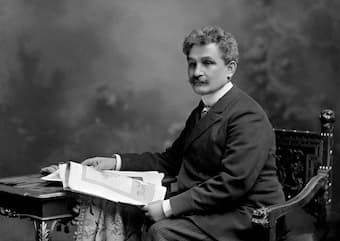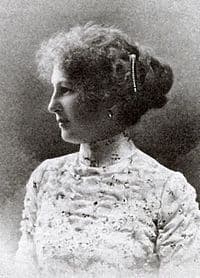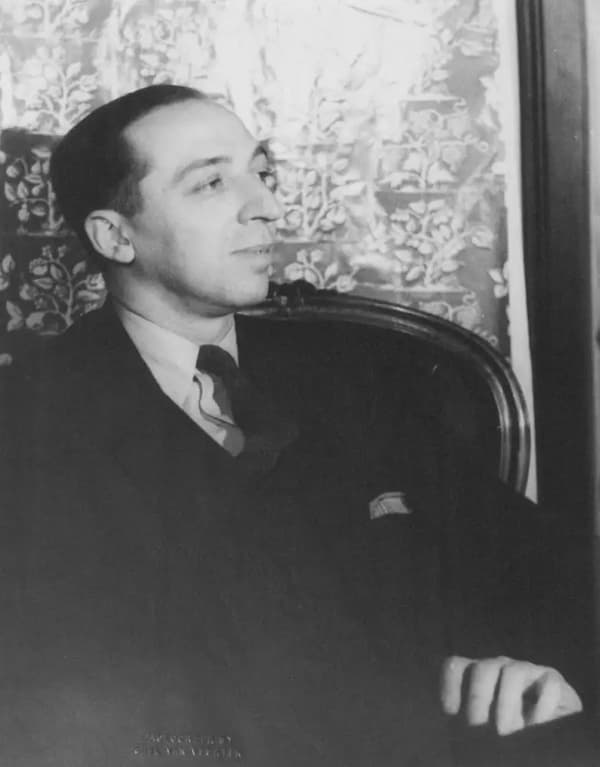
Leoš Janáček
The nationalism that hit the 19th century and carried through to the 20th century had a profound effect on music. Music that had been ignored for its folk-like character, or its non-urban nature, became the basis for new works that not only celebrated the folk sources but also the country itself.
In Czech music history, three composers defined the nation: Bedřich Smetana (1824-1884), Antonín Dvořák (1841-1904), and Leoš Janáček (1854-1928). Janáček took inspiration from Moravian and other Slavic folk music to create his works, supported by his own research into the folklore and music of his country. Achieving international fame in his 60s with his opera Jenůfa, Janáček joined Smetana and Dvořák in symbolizing Czech music.

Olga Janáčková (1882-1903)
A piano cycle created starting around 1900, On an Overgrown Path, had a complicated birth. Seven pieces were originally written for harmonium, and five were published as Slavonic Melodies in 1901 and 1902. The remaining two pieces were set aside. In 1908, Janáček revised the work and wrote 3 more pieces, and made the 8 pieces into a cycle for piano. Two more pieces were added in 1911. That formed series I. Series II, which started with two new pieces, grew with the addition of the two pieces that had been set aside in 1902, forming nos. 1, 2, 3, 5 of Series II. No. 4 is just an ink sketch with some pencil revisions. Series II was published in 1942 after Janáček’s death and the 5 pieces do not have characteristic titles but only tempo indications.
The title for the work, On an Overgrown Path, had been settled by 1901, but the titles of the individual movements changed before the publication of Series I in 1911. For example, No. 2, started out as ‘A Declaration of Love,’ was then changed to ‘A Love Song’ and finally became a much more mysterious title of ‘A Blown-Away Leaf’.
Leoš Janáček: Po zarostlém chodníčku (On the Overgrown Path), Book 1, JW VIII/17 – No. 2. Lístek odvanutý (A Blown Away Leaf) (Thomas Adès, piano)
Janáček described the work as having a double trajectory of ‘distant reminiscences’ of his childhood and reflection on the death of his 20-year-old daughter Olga in 1903.
The first five parts of the cycle refer to his childhood: No. 1. Our Evenings, for evenings by the fireside; No. 3. Come with us!, for children’s games; and no. 4. The Madonna of Frydek, for a religious procession near his home village.
Leoš Janáček: Po zarostlém chodníčku (On the Overgrown Path), Book 1, JW VIII/17 – No. 1. Naše večery (Our Evenings) (Thomas Adès, piano)
Leoš Janáček: Po zarostlém chodníčku (On the Overgrown Path), Book 1, JW VIII/17 – No. 3. Pojd’te s námi! (Come with us!) (Thomas Adès, piano)
Leoš Janáček: Po zarostlém chodníčku (On the Overgrown Path), Book 1, JW VIII/17 – No. 4. Frýdecká Panna Maria (The Madonna of Frydek) (Thomas Adès, piano)
As we get into the second part, emotion, rather than memory, has a place: no. 6. Words fail!, No. 8. Unutterable Anguish, and No. 9. In Tears.
Leoš Janáček: Po zarostlém chodníčku (On the Overgrown Path), Book 1, JW VIII/17 – No. 6. Nelze domluvit! (Words fail!) (Thomas Adès, piano)
Leoš Janáček: Po zarostlém chodníčku (On the Overgrown Path), Book 1, JW VIII/17 – No. 8. Tak neskonale úzko (Unutterable Anguish) (Thomas Adès, piano)
Leoš Janáček: Po zarostlém chodníčku (On the Overgrown Path), Book 1, JW VIII/17 – No. 9. V pláči (In Tears) (Thomas Adès, piano)
No. 7, Good Night!, was a metaphor for Olga’s death, while the last movement, No. 10. The Barn Owl Has Not Flown Away!, refers to the owl’s status as a foreteller of doom.
Leoš Janáček: Po zarostlém chodníčku (On the Overgrown Path), Book 1, JW VIII/17 – No. 7. Dobrou noc! (Good Night!) (Thomas Adès, piano)
Leoš Janáček: Po zarostlém chodníčku (On the Overgrown Path), Book 1, JW VIII/17 – No. 10. Sýček neodletěl! (The Barn Owl has not Flown Away!) (Thomas Adès, piano)
The concept for Janáček’s work is not original to him – parallels can be made with Mussorgsky’s Pictures at an Exhibition and Schumann’s Scenes from Childhood – but it’s Janáček’s change in the work from childhood memories to the tragedies of the grownup parent that make this a unique statement of the human condition.
For more of the best in classical music, sign up to our E-Newsletter


Janacek is one of my favourite composers and I am always transported by his Glagolitic Mass. Of course, I love Smetena and Dvorak’s music and, hailing from Bradford, I also have a soft spot for Frederick Delius .
I discovered Janacek when I was 17. Fifty plus years later I am still discovering his music. Hearing the opening of the Glagolitic Mass as a young man, I thought that the universe could move on that theme. I have listened to the Mass many times since and am still discovering its wonders. Today is the first time I’ve heard ‘On an Overgrown Path’. It’s a privilege to hear such music.
No. 10. Sýček neodletěl! (The Barn Owl has not Flown Away!): ‘Sýček’ should be translated as ‘Little owl’, not ‘Barn owl’. A widespread mistake, in my opinion. I don’t know what caused it.